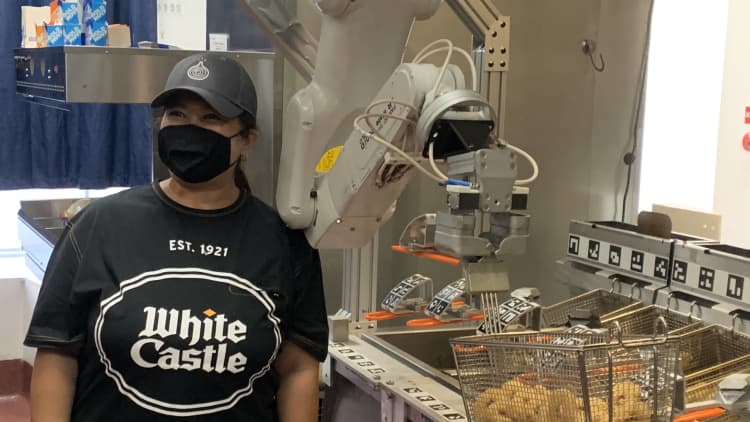Avocados sliced, cored and peeled by the Autocado robot created by Chipotle and Vebu Labs.
Source: Chipotle Mexican Grill
Chipotle Mexican Grill has developed a robot that can cut, core and peel avocados used in its guacamole as the restaurant industry faces a sustained labor shortage.
Today, it takes roughly 50 minutes to make a batch of Chipotle’s guacamole. But the Autocado unveiled Wednesday could cut the prep time in half.
The fast-casual chain developed the collaborative robot, or cobot, in partnership with Vebu Labs, a California-based robotics startup. Chipotle also announced Wednesday that its $50 million venture arm, Cultivate Next, is investing in Vebu. Financial terms weren’t disclosed.
The announcements come as the company and its rivals have experimented with robotics and other forms of automation. The broader restaurant industry is struggling with a shrinking workforce and rising wages.
Sweetgreen recently opened a location in Naperville, Illinois, where it makes its salads and warm bowls on an automated assembly line. Starbucks is investing in coffee-making equipment that creates less work for baristas. Fast-food chains such as Carl’s Jr. are using artificial intelligence software to take drive-thru orders.
How Chipotle’s Autocado works
To prepare avocados using the Autocado, Chipotle employees load up the device with a full case of the ripe fruit. The Autocado can hold up to 25 pounds at one time.
Then, the machine vertically orients the avocados, slices them in half and removes their cores and skin. A bowl at the bottom collects the fruit, which employees can then hand mash and mix with the rest of the guacamole ingredients.
Chipotle still wants employees to have a hand in making their guacamole.
“There’s no plan to test automated guac made in our restaurant,” Curt Garner, Chipotle’s chief technology officer, told CNBC.
Employees don’t have to monitor the Autocado while it prepares the avocados and can even use the top of the device as more counter space to prepare other ingredients.
The prototype is “very close” to design for manufacture, according to Garner. Chipotle expects to test the Autocado in restaurants later this year.
Eventually, Vebu plans to add machine learning capabilities and sensors to the Autocado that will help it evaluate the quality of avocados.
Preparing avocados for guacamole routinely ranks as one of employees’ least favorite tasks, Garner said. It’s also one of the most dangerous duties in Chipotle kitchens, sometimes resulting in knife injuries.
On top of saving time and labor costs, the robot could also cut food waste. If the chain deploys the Autocado across its footprint of more than 3,200 locations, it could help save millions of dollars on avocados annually, the company said.
Despite those savings, guacamole will probably still cost customers extra.
“It’s worth it,” Garner said.
Chipotle has been testing out automation for other kitchen tasks. Since September, one of the company’s California locations has been using Chippy, an autonomous tortilla chip maker created by Miso Robotics, a subsidiary of Vebu.
“We’ve got a few more months of that restaurant test before we’ll officially make the decision whether there’s any more refactoring that needs to be done or whether [Chippy is] ready to go into a different restaurant,” Garner said.
Garner added that the company is exploring more opportunities to automate ingredient preparation and use artificial intelligence to predict how much food to prepare.


